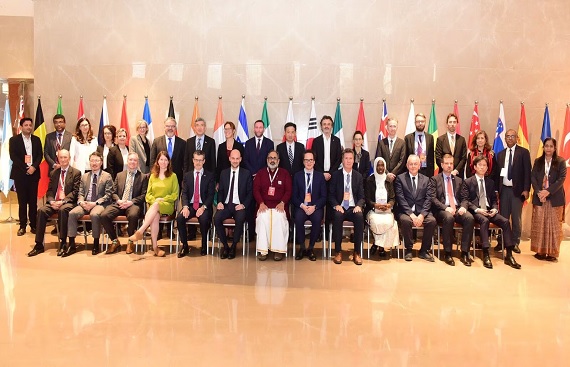New Delhi Declaration Unanimously Embraced by Global AI Partnership
By
siliconindia | Thursday, 14 December 2023, 08:52:42 AM IST

The New Delhi declaration has been unanimously embraced by the Global Partnership on AI, comprising 29 members. This declaration underscores their dedication to fostering a cooperative approach for the development of AI applications that contribute to the well-being of individuals and establishing a worldwide governance framework for secure and reliable AI. Minister of State for IT and Electronics, Rajeev Chandrasekhar, highlighted during a briefing at the ongoing GPAI Summit 2023 that the declaration also aims to ensure the inclusivity and accessibility of AI benefits to all nations globally, including those in the Global South.
The declaration is a significant step forward in international collaboration on AI, amidst global debate on its risks and transformative potential. "We had a 4.5 hour ministerial council meeting where 29 partner countries of GPAI participated and have unanimously adopted the New Delhi declaration, which promises to position GPAI at the front and centre of shaping the future of AI in terms of innovation, and for collaborative AI between partner nations to create applications of AI in healthcare, agriculture and many other areas that concern all of our countries and people", the minister said.
During the meeting, Chandrasekhar stated that the member countries agreed to give GPAI a central role in shaping AI governance and leading conversations about safe and trustworthy AI. GPAI's 29 members include the United Kingdom, the United States, the European Union, Argentina, Australia, Belgium, Brazil, Canada, Czech Republic, Denmark, France, Germany, India, Ireland, Israel, Italy, Japan, Mexico, the Netherlands, New Zealand, Poland, the Republic of Korea, Senegal, Serbia, Singapore, Slovenia, Spain, Sweden, and Turkey.
According to the declaration, Members affirmed their commitment to advance safe, secure, and trustworthy AI through policy, regulation, and other initiatives. "There is serious consensus that we have to move fast as countries in the direction of deploying AI in exploiting the technology for the common good of people, and at the same time we deal with the safety issues, the risks and the harms, and GPAI should play an important role in establishing what can be a global understanding of how to deal with those issues and make safe and trusted AI the norm", Chandrasekhar said.
As AI is set to rapidly expand, 29 countries must collaborate to drive its approach with agility and responsiveness. "Almost every country today is aligned to these twin objectives of harnessing the power of AI and ensuring at the same time that AI is safe and trusted", he noted. Over the next few months, GPAI will work together to set broad principles and guardrails and possibly look to convene a mid-term sitting to discuss those principles and guardrails.
Comprising 29 members, including the UK, Japan, France, and others who share a common vision, GPAI aims to extend its membership to other 'like-minded' nations, aligning with its commitment to inclusivity. Amidst ongoing global dialogues on AI, such as the G7 Hiroshima Declaration and the Bletchley Declaration, GPAI, as a coalition of similar-minded countries, is poised to actively contribute to these worldwide discussions. In accordance with the details outlined in the New Delhi declaration, GPAI is dedicated to harnessing the positive potential of AI while addressing the necessary safeguards and criteria for safety and trust.
During the press briefing, the presence of Viscount Jonathan Camrose, the Minister for AI and IP from the United Kingdom; Hiroshi Yoshida, the Vice Minister for Policy Coordination at the Ministry of Internal Affairs and Communications in Japan; and Jean Noel Barrot, the Minister for Digital Transition and Telecommunications in France, was noted. The declaration highlights the significant role of GPAI in tackling current AI issues, such as generative AI, through practical AI projects designed to address societal issues and global challenges. The objective is to optimize the advantages of AI while minimizing the potential risks associated with its implementation.
Read More News :
Fostering business success through optimal CX
iThink Logistics Integrates what3words for Precise Delivery Solutions



